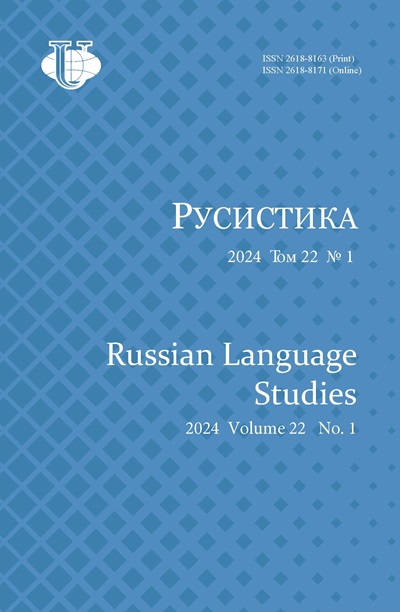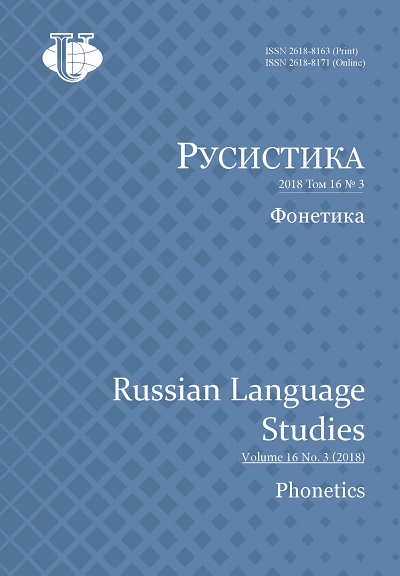ДИНАМИКА ФОНЕТИЧЕСКИХ НАВЫКОВ И РАЗВИТИЕ ФОНЕМАТИЧЕСКОГО СЛУХА В ПРОЦЕССЕ ОБУЧЕНИЯ РУССКОМУ ЯЗЫКУ КИТАЙСКИХ УЧАЩИХСЯ
- Авторы: Хэ С.1
-
Учреждения:
- Пензенский государственный университет
- Выпуск: Том 16, № 3 (2018): ФОНЕТИКА
- Страницы: 344-358
- Раздел: Страничка молодого ученого
- URL: https://journals.rudn.ru/russian-language-studies/article/view/19244
- DOI: https://doi.org/10.22363/2618-8163-2018-16-3-344-358
Цитировать
Полный текст
Аннотация
В статье представлены теоретические выводы сопоставительного анализа фонетических систем двух языков и экспериментальные данные, полученные в процессе наблюдения за динамикой фонетических навыков и развитием фонематического слуха китайских учащихся (подготовительного факультета, бакалавров-филологов и магистрантов - филологов). Описание динамики фонетических навыков и наблюдение за развитием фонематического слуха имеет практическую и теоретическую значимость, так как для преподавателя важно определить причину неправильного произношения звуков и найти оптимальный путь к исправлению ошибок. Только при теоретическом (лингвистическом) и экспериментальном способе изучения акцента можно представить наиболее объективную картину интерферирующего влияния родного (китайского) языка учащихся. Сопоставительный анализ фонетических систем двух языков как система объективных данных о фонетико-интонационных различиях типологически разных языков позволяет спрогнозировать фонетические трудности и предполагаемый акцент китайцев, изучающих русский язык; выявить различия, фонетические лакуны, где возможна подмена «чужого своим»; дифференцировать объективные, вызванные интерференцией родного языка, и субъективные ошибки учащихся. Экспериментально выявлены типичные, устойчивые фонетические ошибки, являющиеся следствием лингвистических особенностей двух языков и отчасти субъективных факторов (психологических, физиологических) учащихся в определенных условиях обучения. Цель статьи показать, что развитие фонематического слуха в процессе изучения иностранного языка и динамика фонетических навыков связаны между собой и служат важнейшим условием, определяющим успех изучения иностранного языка. Время, сэкономленное преподавателем на отработку фонетики, - потерянное время при обучении иностранному языку.
Об авторах
Синьсин Хэ
Пензенский государственный университет
Автор, ответственный за переписку.
Email: hexinx@yandex.ru
аспирант Пензенского государственного университета, ассистент кафедры «Русский язык как иностранный» Пензенского государственного университета. Сфера научных интересов: лингводидактика, методика преподавания русского языка как иностранного, фонетика и интонация русского языка. Автор 10 научных публикаций
Российская Федерация, 440026, Пенза, ул. Красная, 40Список литературы
- Азимов Э.Г., Щукин А.Н. Словарь методических терминов. СПб.: Златоуст, 1999. С. 299
- Барановская С.А. Обучение русскому произношению иностранцев. М.: Изд-во РУДН, 1984. 86 с
- Бернштейн С.И. Вопросы обучения произношению (применительно к преподаванию русского языка как иностранного) / Вопросы фонетики и обучение произношению. М.: Изд-во МГУ, 1975. С. 5-49
- Колосов К.М. К вопросу об артикуляционной базе языка / Теоретические проблемы фонетики и обучение произношению. М.: МГУ, 1971. С. 36-57
- Леонтьев А.Н. Избранные психологические произведения. В 2-х т. Т. I. М.: Педагогика, 1983. 392 с
- Поливанов Е.Д. Статьи по общему языкознанию. М.: Наука, 1968. С. 249-250
- Реформатский А.А. О сопоставительном методе // Русский язык в национальной школе. 1962. № 5. С. 23-33
- Самуйлова Н.И. Вопросы лингвистического обоснования методики обучения произношению / Вопросы обучения русскому произношению. М.: МГУ, 1978. С. 3-8
- Щерба Л.В. Фонетика французского языка. М.: Высшая школа, 1957. 308 с
- Щукин А.Н. Методика преподавания русского языка как иностранного. М.: Высшая школа, 2003. С. 38















